Chapter VIII: Poverty and detachment - hospitality towards one's neighbors
- Entire (3.67 Mo)
- Part 1 (1.62 Mo)
- Part 2 (857 Ko)
- Part 3 (1.26 Mo)
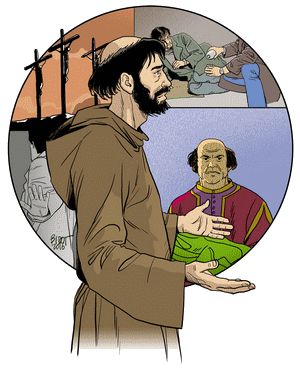 It is with little Zacchaeus that we will begin to understand what poor in spirit means, which is the beatitude that opens the way to all the others. As usual, we will continue down our path with Francis, who was so closely wed to Lady Poverty that his contemporaries as well as posterity, with good reason, named him « Poverello » or Poor Man. Finally, we will end our chapter with articles 11 and 13 of our Rule, which importantly invite us to free ourselves from all desire of possession and domination, giving us the liberty necessary to accept and welcome all men, especially the poorest.
It is with little Zacchaeus that we will begin to understand what poor in spirit means, which is the beatitude that opens the way to all the others. As usual, we will continue down our path with Francis, who was so closely wed to Lady Poverty that his contemporaries as well as posterity, with good reason, named him « Poverello » or Poor Man. Finally, we will end our chapter with articles 11 and 13 of our Rule, which importantly invite us to free ourselves from all desire of possession and domination, giving us the liberty necessary to accept and welcome all men, especially the poorest.
- 0
TODAY I MUST STAY AT YOUR HOUSE
TODAY I MUST STAY AT YOUR HOUSEWe will begin this chapter with Zacchaeus, this tax collector and thief, who is trying to see Jesus (Lk 19:1-10). It is in this type of Gospel passage that we learn more about ourselves, for after all, in this small Zacchaeus, thief, we can see a little of ourselves…
Zacchaeus
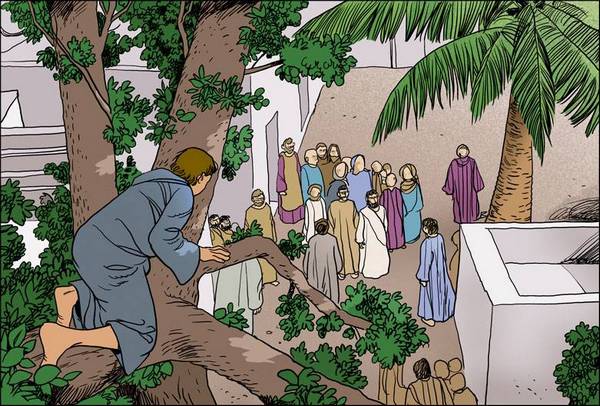 Jesus was passing through the city of Jericho. Now a man there named Zacchaeus, who was a chief tax collector and also a wealthy man, was seeking to see who Jesus was; but he could not see him because of the crowd, for he was short in stature. So he ran ahead and climbed a sycamore tree in order to see Jesus, who was about to pass that way. When he reached the place, Jesus looked up and said to him, "Zacchaeus, come down quickly, for today I must stay at your house." And he came down quickly and received him with joy. When they all saw this, they began to grumble, saying, "He has gone to stay at the house of a sinner." But Zacchaeus stood there and said to the Lord, "Behold, half of my possessions, Lord, I shall give to the poor, and if I have extorted anything from anyone I shall repay it four times over." And Jesus said to him, "Today salvation has come to this house because this man too is a descendant of Abraham. For the Son of Man has come to seek and to save what was lost."
Jesus was passing through the city of Jericho. Now a man there named Zacchaeus, who was a chief tax collector and also a wealthy man, was seeking to see who Jesus was; but he could not see him because of the crowd, for he was short in stature. So he ran ahead and climbed a sycamore tree in order to see Jesus, who was about to pass that way. When he reached the place, Jesus looked up and said to him, "Zacchaeus, come down quickly, for today I must stay at your house." And he came down quickly and received him with joy. When they all saw this, they began to grumble, saying, "He has gone to stay at the house of a sinner." But Zacchaeus stood there and said to the Lord, "Behold, half of my possessions, Lord, I shall give to the poor, and if I have extorted anything from anyone I shall repay it four times over." And Jesus said to him, "Today salvation has come to this house because this man too is a descendant of Abraham. For the Son of Man has come to seek and to save what was lost."
Who is Zacchaeus ?
According to his contemporaries, Zacchaeus is a sinner, a seemingly irreparable state in the eyes of the « pure » and « perfect ». In brief, he is a man condemned without appeal on the part of all those who truly have nothing to be ashamed of. Moreover, in the word condemned, there is practically the word damned. We must recognize objectively that this assessment of Zacchaeus’ state of sin is not without foundation. Jesus himself recognizes it, but he does not condemn, “For the Son of Man has come to seek and to save what was lost.”
Chief of the tax collectors (those publicans in the pay of Herod and the Romans), the man is very wealthy. It is not the fact that he’s rich per se which causes the state of sinfulness; but the way in which the money is earned can be cause for sin. It is then “dirty money”. By his own admission, Zacchaeus does not have only “honest money” in his wallet, “if I have extorted anything from anyone I shall repay it four times over.” That clearly suggests that his wealth was not necessarily acquired in a very honest way. The way in which money is spent can also be occasion for sin. The evangelist Matthew, a former publican, always associates in his gospel the word publican with the word sinner or the word prostitute. Publicans were then lovers of life, incorrigible pleasure seekers who enjoyed life without a care for others. If this passage about Zacchaeus does not speak expressly of sinners or prostitutes, his firm resolution - Behold, half of my possessions, Lord, I shall give to the poor – shows that before that precise moment Zacchaeus had to have lived like a good old self-respecting selfish man.
The meeting and its fruits
Little Zacchaeus represents each one of us, torn between our search for earthly happiness and that both mysterious and profound attraction towards the One who Is. Like Zacchaeus, we are too little to see Jesus, but the confused desire for this meeting gives us wings - he ran ahead and climbed a sycamore tree * The evangelist Luke, true to form, gratifies us again with one of these small details he has a flair for and which, in an innocuous form, gives us a glimpse of something far from trivial. Why then a sycamore? Why doesn’t Luke remain more general in his text, writing simply that Zacchaeus climbed a tree? It is because the evangelist sees in this detail a particular meaning which enriches the narrative. The sycamore is a sort of wild fig tree. Its fruit resembles the fig but is only edible through a special treatment. What Luke wants to tell us is that the sycamore, with its inedible fruit, represents Zacchaeus, an unrepentant publican before meeting the Savior. Jesus the Savior is the One who gives the special treatment, the treatment which makes the “sycamore’s” fruit “edible.” in order to see Jesus. Yes, grace always precedes us. It raises us above our mediocrity so that the desired meeting can take place. But it is not in the tree that the meeting happens. Mystery of God’s gift, it is not Zacchaeus who climbs toward Jesus, but Jesus who descends into his house, into his heart, into his soul. It is the plan of holy salvation for all men’s lives. And so it is for every Christian conversion. It does not consist in a straining of our paltry forces towards the divinity, but in a confident welcoming of this discreet and fulfilling coming of God into our lives.
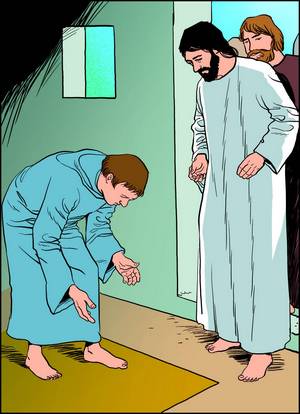 Little Zacchaeus’ meeting with his God does not end with the happiness of close contact, even if that truly exists. But the consequences of this meeting spread out into all aspects of the person’s life when he has met God. Suddenly conscious of the treasure that God came to place in his heart, Zacchaeus goes back to his brothers to share it with them, “Behold, half of my possessions, Lord, I shall give to the poor.” And becoming aware of his faults and insignificance, Zacchaeus wants to repair the wrongs he has done, “and if I have extorted anything from anyone I shall repay it four times over.”
Little Zacchaeus’ meeting with his God does not end with the happiness of close contact, even if that truly exists. But the consequences of this meeting spread out into all aspects of the person’s life when he has met God. Suddenly conscious of the treasure that God came to place in his heart, Zacchaeus goes back to his brothers to share it with them, “Behold, half of my possessions, Lord, I shall give to the poor.” And becoming aware of his faults and insignificance, Zacchaeus wants to repair the wrongs he has done, “and if I have extorted anything from anyone I shall repay it four times over.”
Jesus rejoices over this conversion, because this man too is a descendant of Abraham. However, and while Zacchaeus’ (a wealthy person) search for the divinity strangely resembles that of the rich young man who asked Jesus, “Good master, what good shall I do that I may have life everlasting?” (Mt 19:16), the gospel text does not tell us that Zacchaeus sold all his goods to give to the poor and that he began to follow Jesus. That is nevertheless what Jesus asks of the rich young man, “If you wish to be perfect, go and sell your possessions and give the money to the poor, and you will have treasure in heaven; then come, follow me.” Concerning Zacchaeus, the absence of this type of conclusion suggests that he continued in his duty to the state as tax collector, but that he also completely changed his behavior and lifestyle. It also means that if Jesus indeed calls all men to follow him, He does not invite each of us to follow him in the same way. Likewise, He does not expect from each of us the same “results” in human terms, but a spirit in keeping with His. The parable of the talents (Mt 25:14-30) is particularly eloquent on this subject. When the master goes away, he confides his goods to his servants. To one he gave five talents; to another, two; to a third, one - to each according to his ability. Not one receives the same as another, but each according to his ability. We could translate: each according to his state of life; for a monk and a father of a family, for example, it will be different. Yet we can see in the master’s wording on his return that his joy is absolutely the same towards the servant who earned five new talents as towards the one who earned two, “Well done, good and trustworthy servant; you have shown you are trustworthy in small things; I will trust you with greater; come and join in your master's joy” (Mt 25:21 and 23).
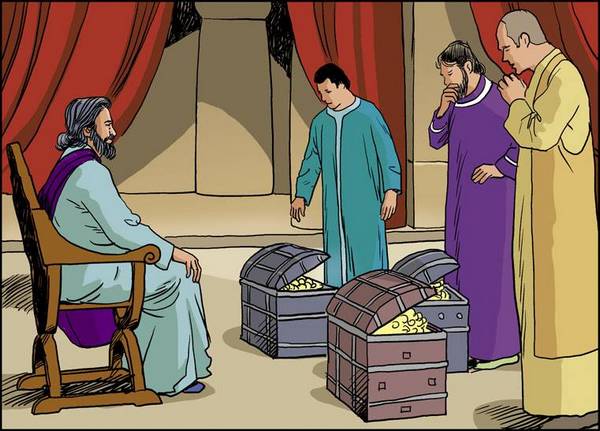
The master does not then expect the same choices in life from every man (if all the population of the planet decided, all at once, to be a contemplative monk or nun, it is easy to imagine the chaos that would result), but a spirit infusing everyone’s life which in all cases is in accordance with His. We can here recall what we dealt with in the preceding chapter, namely that the first and fundamental vocation the Father offers to each layperson in Jesus Christ through the intermediary of the Spirit is the vocation to holiness, i.e. the perfection of charity. And so, whether one is rich or poor, healthy or sick, prince of this world or humble subject, overworked or unemployed, may what we say and what do always be done in the name of the Lord Jesus Christ, offering through Him our thanksgiving to God the Father. In short, and at the risk of repeating myself, what the Lord expects of us is that we become saints.
The saint conquers God and his Kingdom by faithfully following divine Law, that given by God in the Sinai. Christ tells us that He came to uphold, not abolish, this Law (Mt 5:17) * We find in Saint Matthew a presentation of the Kingdom of God (chapter 5 – 7) developped through five principal subjects. 1. What attitude must guide the Kingdom’s sons (5:3-48); 2. With what attitude they must “perfect” Judaism’s laws and practices (6:1-18); 3. Detachment from riches (6:19-34); 4. Neighborly relations (7:1-12); 5. Entering into the Kingdom through decisive choice manifested by actions (7:13-27).. He gives us numerous insights on this divine Law so as to help us better follow it, to better share it. Among these insights we find at the forefront the beatitudes.
The beatitudes
The beatitudes (Mt 5:1-12) appear like a distillation of the Lord’s thinking. These words, more than any other, entail a total adherence to, an intense communion with God’s will. This message of the beatitudes will not bear any compromises, it promises what it says! And whoever hears it cannot bargain with it: he accepts or rejects it. Its content is indeed less moral than spiritual. The Lord gives us no options. He indicates the way, the only road to happiness. And not happiness on earth, which is fragile and volatile, but of the beatitude. We call beatitude this participation in God’s glory in heaven which is the content of the virtue of hope. This beatitude, or eternal happiness, can already be experienced on earth. It is given to those who live by one or the other of the nine proposed ways and in which it is necessary to ask God to give us the gift. They are the ways of poverty, meekness, compassion, obedience, mercy, purity, peace, persecution, patience. We are all invited to live by at least one, according to our charisma. We must be permeated with it, rejoice in it, look for it beyond happiness on earth, this revealed happiness: to be in harmony with Christ and the Father. * From Fernand Dumont’s sermon (Lion of Judah community), written for the Ephata Missal, 4th week of Ordinary Time, Sunday A, p. 1008, Le Sarment (The Vine Shoot)/Fayard, 1988.
We will consider the first beatitude, so often misunderstood, where the Lord promises us the Kingdom of heaven : “ Blessed are the poor in spirit, for theirs is the kingdom of heaven” (Mt 5:3).
Blessed are the poor in spirit
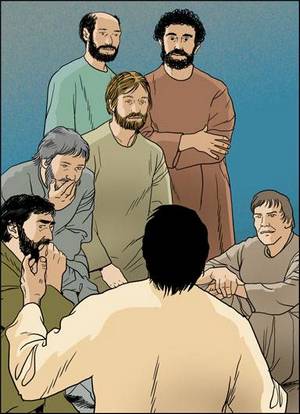 A biased reading would consist of using this sentence from the gospel, associated with several others, to reach the mistaken alternative that only the poor (meaning materially poor) will be allowed into the Kingdom of heaven. As for the rich, they are obviously headed to the flames of hell. Another “biased” reading would translate “poor in spirit” by stupid, or even inoffensive idiot. A third yet, would translate it by deceit and wickedness. A last one, finally, would confuse spirit and intelligence or thought.
A biased reading would consist of using this sentence from the gospel, associated with several others, to reach the mistaken alternative that only the poor (meaning materially poor) will be allowed into the Kingdom of heaven. As for the rich, they are obviously headed to the flames of hell. Another “biased” reading would translate “poor in spirit” by stupid, or even inoffensive idiot. A third yet, would translate it by deceit and wickedness. A last one, finally, would confuse spirit and intelligence or thought.
However, the spirit is very far above intelligence * Lines extracted from Centro Editoriale Valtortiano, Isola del Liri, Italy, The Gospel as it was revealed to me, Maria Valtorta, Vol. 6, chap. 108, pp. 196 - 198.. It is the king of everything in us. All the physical and moral qualities are subjects and servants for this king. It is so in all men devoted as sons to God, who know how to keep things in their rightful place. There where, to the contrary, filial devotion does not exist, idolatries arise, and servants become queens and dethrone the spirit king. It is thus that anarchy produces ruins, like all anarchies.
To be poor in spirit consists in that sovereign freedom with respect to all things which is man’s delight. The poor in spirit are no longer slave to riches:
- A person poor in spirit is someone who, even if he is not able to materially renounce riches by giving away everything like a Saint Francis of Assisi, uses it not only for himself but also thinks of others through generous giving to the poor. He has understood the gospel sentence, “Make friends for yourselves with dishonest wealth” (Lk 16:9). His money, which could be an enemy to his spirit, leading it to lust, greediness and lack of charity, becomes his servant by smoothing the way to Heaven, covering it with his mortification and works of charity to help alleviate the misery of his fellow man;
- A person poor in spirit is someone who, losing all sources of income, whether big or small, knows how to hold on to peace and hope, neither cursing nor hating God nor man;
- A person poor in spirit is someone who, materially poor, has no trace of hate for the rich, wishing them no harm. Truly poor, he is cheerful in his poverty and finds his bread good. He is cheerful for he escapes gold fever, his sleep knows no nightmares and he gets up well rested and ready to go to a job which seems easy to him because he does it without greed and without envy;
- A person poor in spirit is someone who, rich or poor in family or marriage, in friends, in gifts received (intellectual riches, public responsibilities, …), does not become attached to any of these riches. That does not mean that it is good to hate all goods that God gives us, especially love for our neighbors. But we must love our father, mother, spouse and neighbor to the extent that God himself has fixed for us: “like ourselves”. While God must be loved above all and with all our being.
All the graces that God gives us are love. It is by love that they are given. It is with love that we must use this wealth of affection and goods that God gives us. And only the person who does not idolize it but uses it as a means to serve God in holiness, shows that he does not have an unhealthy and unholy attachment to his goods. He practices then holy poverty of spirit which strips him of everything so as to be free to conquer Holy God, Supreme Richness. To conquer God is to possess the Kingdom of Heaven.
The poor in spirit open the way to the other beatitudes
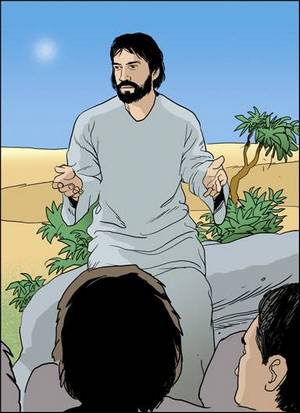 Jesus begins his sermon on the mount by this beatitude of poverty. It is not a coincidence that this beatitude is the first one mentioned. As Saint Ambrose said, the virtue of poverty is like the foundation and source for the other beatitudes. First in the order of virtues, it is the mother and creator of the other virtues. He gives the reason: He who despises temporal things merits the eternal ones. No one will gain possession of the celestial Kingdom who, overcome by the greed of the century, does not have the strength to break out, to emerge. That is why Christ does not hesitate to give this formidable metaphorical warning after the departure of the young rich man, “Amen, I say to you, it will be hard for one who is rich to enter the kingdom of heaven. Again I say to you, it is easier for a camel to pass through the eye of a needle than for one who is rich to enter the kingdom of God.” (Mt 19 :23-24).
Jesus begins his sermon on the mount by this beatitude of poverty. It is not a coincidence that this beatitude is the first one mentioned. As Saint Ambrose said, the virtue of poverty is like the foundation and source for the other beatitudes. First in the order of virtues, it is the mother and creator of the other virtues. He gives the reason: He who despises temporal things merits the eternal ones. No one will gain possession of the celestial Kingdom who, overcome by the greed of the century, does not have the strength to break out, to emerge. That is why Christ does not hesitate to give this formidable metaphorical warning after the departure of the young rich man, “Amen, I say to you, it will be hard for one who is rich to enter the kingdom of heaven. Again I say to you, it is easier for a camel to pass through the eye of a needle than for one who is rich to enter the kingdom of God.” (Mt 19 :23-24).
This freedom of the poor in spirit in the face of slavery to money, freedom necessary to gain the Kingdom of heaven, requires great virtues. We will cite three:
- Humility of thought which is not puffed up with pride and does not proclaim itself superior. He uses God’s gift and recognizes in it the Origin, for Good. Only for that;
- Generosity in affections, which he knows how to renounce to follow God. The truest wealth and the most instinctively loved by the animal creature is life. Martyrs are all generous in this way because their spirit knows how to be poor so as to become “rich” in the unique eternal richness: God:
- Justice in love of personal things. To love them, because as a witness to Providence, it is a duty. But not to love them to the point of loving them more than God and his Will; to love them, but not to the point of condemning God if a man’s hand rips them away.
These are the different forms of spiritual poverty which Christ said that, along with justice, would permit us to possess Heaven. We see that it consists in putting away all the passing riches of human life so as to gain eternal wealth. That, our little Zacchaeus had understood. That, Francis of Assisi understood. We can already guess the inescapable conclusion: it is up to me to understand it today.
THE POVERELLO (POOR MAN)
Each saint has his own characteristics. Francis’ contemporaries, as well as posterity, were not mistaken. They named him the Poverello, the poor man.
A well known fact from Francis’ life will enable us to « taste » his first steps towards her whom he will call the poor Lady.
The most beautiful and noble spouse
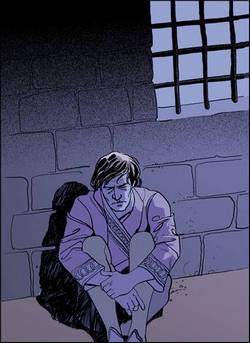 This episode is placed in the third year of his conversion. It occurs after a long year of Francis’ captivity in Perugia and another long year of sickness. After that, Francis undertakes multiple disjointed projects, the most famous of which is the outing for the crusades, ending in Spoleta the day after departure. Francis, already changed in his heart, but weak and irresolute, is still feeling his way. His companions, little interested in mysticism, try to attract him back to his former noisy pleasures * A part of the analysis and commentaries contained in these lines are extracted from the book by Valentin Breton, ofm, Poverty, Franciscan Editions, 1959, the text having been revised for the necessities of the format..
This episode is placed in the third year of his conversion. It occurs after a long year of Francis’ captivity in Perugia and another long year of sickness. After that, Francis undertakes multiple disjointed projects, the most famous of which is the outing for the crusades, ending in Spoleta the day after departure. Francis, already changed in his heart, but weak and irresolute, is still feeling his way. His companions, little interested in mysticism, try to attract him back to his former noisy pleasures * A part of the analysis and commentaries contained in these lines are extracted from the book by Valentin Breton, ofm, Poverty, Franciscan Editions, 1959, the text having been revised for the necessities of the format..
He allows himself yet again to be mislead; he organizes a party in which he is, as usual, the provider and the king. Celano, who seems to be talking about his memories, says that the guests ate and drank more than they should have. Their clothes, talk and coarse enjoyment inspire in Francis a feeling of repugnance for this entertainment. On leaving the banquet, the troop of merry fellows goes down the sloping Assisi alleyways, singing, making a racket, exciting the dogs, calling to the rare passers-by, waking up the sleeping citizens. Francis brings up the rear, his comic scepter in his hand. But little by little, Francis falls behind. Lifting his eyes, he perceives, between the houses so close to each other, a small part of the Umbrian starry sky. How beautiful! How crystal clear! And as his friends’ laughter dies away, the night’s silence wraps him in its coat. His soul becomes deaf to noise and his heart begins singing the Lord’s praises.
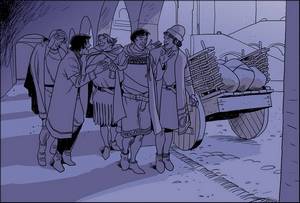 Divine sweetness floods through him, so powerful that he is incapable of saying a word, of taking a step. His soul is swept away with such momentum towards the invisible realities that he begins despising all things earthly as frivolous and worthless. How long does he stay like that, frozen in contemplation? A big slap on the back along with an exclamation brings him suddenly back to reality. “Hey! Francesco! You wouldn’t by chance be in love, daydreaming like you are ? Were you dreaming of taking a wife?” The question arouses strong laughter. Indeed, his companions, no longer seeing Francis, went back up looking for him. They are surrounding him now, still as loud as before. Francis, surprised, opens his eyes wide and exclaims in the same tone, « Yes ! I love her, I love her, I love her, and much more than you could possibly imagine! Truly I tell you, I would take her, so beautiful and so noble that the like of her will never be seen!” New shouts of laughter greet this declaration, so true to Francis’ way of speaking. They go together up to the piazzetta where they take their leave from each other.
Divine sweetness floods through him, so powerful that he is incapable of saying a word, of taking a step. His soul is swept away with such momentum towards the invisible realities that he begins despising all things earthly as frivolous and worthless. How long does he stay like that, frozen in contemplation? A big slap on the back along with an exclamation brings him suddenly back to reality. “Hey! Francesco! You wouldn’t by chance be in love, daydreaming like you are ? Were you dreaming of taking a wife?” The question arouses strong laughter. Indeed, his companions, no longer seeing Francis, went back up looking for him. They are surrounding him now, still as loud as before. Francis, surprised, opens his eyes wide and exclaims in the same tone, « Yes ! I love her, I love her, I love her, and much more than you could possibly imagine! Truly I tell you, I would take her, so beautiful and so noble that the like of her will never be seen!” New shouts of laughter greet this declaration, so true to Francis’ way of speaking. They go together up to the piazzetta where they take their leave from each other.
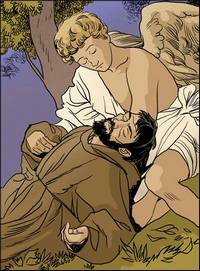 This so beautiful and noble spouse that Francis saw appearing to him in the clear night, Francis ended up giving her a name : Lady poverty. He will become attached to her and will be faithful to her all his life. He will invite all his brothers to do the same, as his Siena testament testifies: in April or May 1226, six months before his death, Francis vomits blood so abundantly that they believe him close to death. The brothers ask him for his blessing and his dying wish. He asks for Brother Benedict and tells him, […] I bless all my brothers […]. I am too weak and it is too hard to speak. In short I want to declare my will in the few words that follow: […] May they always love and honor our Lady the holy Poverty […] * Test Si 4. But make no mistake. Francis is no more theoretician than dialectician. What pushes him « to marry » Lady poverty is not a philosophico-theoretico-ascetic love: poverty at any price, all poverty, nothing but poverty, and all that for poverty. No! For Francis, poverty is not an end in itself. Very simply, he saw Jesus Christ poor, teaching poverty, and he followed Him. He loved Christ. He desired to become like Him. He lived as a poor man, he urged his race to live in poverty and from poverty. Poverty, established by God as “Queen and Mistress,” became the Spouse of Christ who, “although he was rich, he became poor for your sake, so that you should become rich through his poverty (2 Co 8:9).” Poverty is then mediator of salvation and it is to have a part in this salvation that Francis and his companions will establish a covenant and pronounce an oath of allegiance to it.
This so beautiful and noble spouse that Francis saw appearing to him in the clear night, Francis ended up giving her a name : Lady poverty. He will become attached to her and will be faithful to her all his life. He will invite all his brothers to do the same, as his Siena testament testifies: in April or May 1226, six months before his death, Francis vomits blood so abundantly that they believe him close to death. The brothers ask him for his blessing and his dying wish. He asks for Brother Benedict and tells him, […] I bless all my brothers […]. I am too weak and it is too hard to speak. In short I want to declare my will in the few words that follow: […] May they always love and honor our Lady the holy Poverty […] * Test Si 4. But make no mistake. Francis is no more theoretician than dialectician. What pushes him « to marry » Lady poverty is not a philosophico-theoretico-ascetic love: poverty at any price, all poverty, nothing but poverty, and all that for poverty. No! For Francis, poverty is not an end in itself. Very simply, he saw Jesus Christ poor, teaching poverty, and he followed Him. He loved Christ. He desired to become like Him. He lived as a poor man, he urged his race to live in poverty and from poverty. Poverty, established by God as “Queen and Mistress,” became the Spouse of Christ who, “although he was rich, he became poor for your sake, so that you should become rich through his poverty (2 Co 8:9).” Poverty is then mediator of salvation and it is to have a part in this salvation that Francis and his companions will establish a covenant and pronounce an oath of allegiance to it.
The poor before God
Francis’ ecstasy revealed to him the meaning of a truth that we all know, but to which, like most men, we are indifferent; Francis had been until that moment. But the Lord’s grace “works in” him. It brings him to ask these questions : Who are you, Lord ? And who am I? And without speaking, he understands that:
- God is everything, and he, Francis, nothing, other than what pleases God that he should be. Francis is nothing other than what God makes him to be ;
- God possesses everything, and he, Francis, nothing, other than what it suits God to lend him ;
- God makes everything, and he, Francis, nothing, other than what God, in his bounty, deigns to make in him, by him, with him…
Francis becomes aware of his essential and absolute dependence on God and consequently his absolute indigence. We ourselves live as if we believe we possess our being, our body, our soul, our spirit and its faculties, in complete ownership and independence. We use it, enjoy it and abuse it in full control. We feel, indeed, that we are our own masters. We live, act, move and stir, go and come, think and speak freely, and we have the right to do so. We are right: our autonomy is not imaginary, it is real. It is nevertheless God’s gift. He gave us to ourselves. But in so giving us authority over ourselves, creating us as our own masters, free and responsible, he could not divest his own right over us. If he could not do it, it is not at all through powerlessness (or stinginess) on his part, but through our incapacity. It is in Him and through Him, it is thanks to His immanence in us, to his active and perpetual presence in us as cause of our being and our actions that we live, act and are. Unfortunately we do not think that our dependence on God is the root or source of our being.
As for Francis, as soon as he understands this he accepts his condition as creature with joy. He makes it his title of honor. By discovering his dependence, accepting his indigence, professing his poverty, Francis discovered and recognized the universal brotherhood of beings. Like him and with him, men receive from God the Father being, movement and life, beggars in their essential poverty. So he invites all men, and not only his brothers, not to be proud of God’s gifts but to place their pride in the cross of the Lord Jesus Christ who, though rich, made himself poor for us, so that from his indigence we would be enriched:
Consider, O man, how great the excellence in which the Lord has placed you because He has created and formed you to the image of His beloved Son according to the body and to His own likeness according to the spirit […]
For if you were so clever and wise that you possessed all science, and if you knew how to interpret every form of language and to investigate heavenly things minutely, you could not glory in all this […]. In like manner, if you were handsomer and richer than all others, and even if you could work wonders and put the demons to flight, all these things are hurtful to you and in nowise belong to you, and in them you cannot glory (2 Cor 12:5); that, however, in which we may glory is in our infirmities, and in bearing daily the holy cross of our Lord Jesus Christ. * Adm 5. This admonition’s theme will be taken up again, in a more lyrical and dramatic way, by Saint Francis himself in the celebrated setting of Perfect Joy (Fior 8). This chapter so widely read and so badly misunderstood because it is mostly seen as a beautiful page of literature, is in reality a strong lesson of love for the cross and a recognition of our absolute dependance on God from whom we receive everything (Saint Francis of Assisi, his personality, his spirituality, Paris 1928, pp. 81 - 82 P. Gratien, O.M Cap.).
The poor before men
Let us then think about the scene which takes place on April 16, 1207, in the main audience chamber of the bishop’s palace. By his father, Peter Bernardone, Francis is summoned to appear in front of Bishop Guido to be accountable for his behavior and his profligacy and to put to an end to what Pierre Bernardone calls his madness.
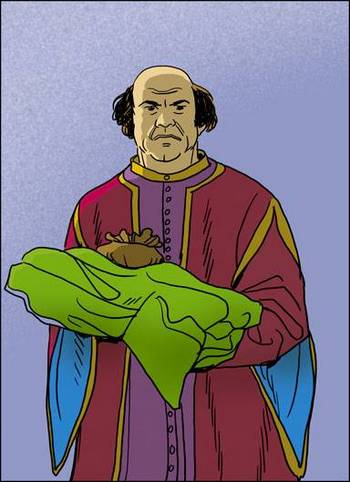 Up to then Peter Bernardone had assumed his son’s huge expenses without complaint since they were oriented towards a very earthly glory which reflected on the family. But to give money to the poor, to fritter away family assets to restore a chapel, that no! Never! It’s too much! Peter Bernardone expects this proceeding to bring Francis back to his senses or at least to get back the money that he had stolen. However, the course of the trial does not really go as Peter would have liked. After his father’s testimony, Francis places at his feet not only the money taken to repair the chapel but all the clothes he is wearing as well. And so, completely undressed, he cries out in a loud voice, “Up to now I called Peter Bernardone my father; today I refuse all his goods. From now on I will no longer say, “My father is Peter Bernardone, but Our Father who art in heaven!” This act is not just symbolic. By so doing Francis publicly renounces his family inheritance. He is raring to put into practice the doctrine he received from God. Knowing Francis a little better now, we could almost say we saw this coming. But the drama’s outcome shows us how God “settles the debt” that He freely contracted with his creature. To the gesture of Francis’ total renouncement, Bishop Guido comes down from his throne, covers the naked young man with his cape and takes him under the protection of the Church. Finally God settles his debt to the poor through a fellowman’s compassion and charity: My birthright, my cup is Yahweh; you, you alone, hold my lot secure (Ps 15:5).
Up to then Peter Bernardone had assumed his son’s huge expenses without complaint since they were oriented towards a very earthly glory which reflected on the family. But to give money to the poor, to fritter away family assets to restore a chapel, that no! Never! It’s too much! Peter Bernardone expects this proceeding to bring Francis back to his senses or at least to get back the money that he had stolen. However, the course of the trial does not really go as Peter would have liked. After his father’s testimony, Francis places at his feet not only the money taken to repair the chapel but all the clothes he is wearing as well. And so, completely undressed, he cries out in a loud voice, “Up to now I called Peter Bernardone my father; today I refuse all his goods. From now on I will no longer say, “My father is Peter Bernardone, but Our Father who art in heaven!” This act is not just symbolic. By so doing Francis publicly renounces his family inheritance. He is raring to put into practice the doctrine he received from God. Knowing Francis a little better now, we could almost say we saw this coming. But the drama’s outcome shows us how God “settles the debt” that He freely contracted with his creature. To the gesture of Francis’ total renouncement, Bishop Guido comes down from his throne, covers the naked young man with his cape and takes him under the protection of the Church. Finally God settles his debt to the poor through a fellowman’s compassion and charity: My birthright, my cup is Yahweh; you, you alone, hold my lot secure (Ps 15:5).
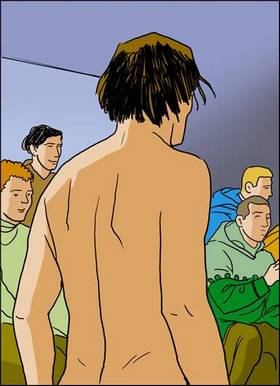 Francis’ gesture is sacramentally reproduced by all who in the ecclesiastical or monastic orders renounce the world so as to give themselves to God; the verse from the Psalms above is specifically recited as the expression of the reciprocal promises of God and of those who consecrate themselves to his service. Bishop Guido of Assisi’s act, liturgical in the clergy’s rite of admission to the Lord’s inheritance, was in reality prophetic concerning Francis and his followers. It foretold and symbolized the aid the Church grants its servant and its triple posterity for eight centuries. But before that, it clearly affirmed that God honors his word as well as poor people’s confidence in him through the compassion and charity of our fellowman.
Francis’ gesture is sacramentally reproduced by all who in the ecclesiastical or monastic orders renounce the world so as to give themselves to God; the verse from the Psalms above is specifically recited as the expression of the reciprocal promises of God and of those who consecrate themselves to his service. Bishop Guido of Assisi’s act, liturgical in the clergy’s rite of admission to the Lord’s inheritance, was in reality prophetic concerning Francis and his followers. It foretold and symbolized the aid the Church grants its servant and its triple posterity for eight centuries. But before that, it clearly affirmed that God honors his word as well as poor people’s confidence in him through the compassion and charity of our fellowman.
God thus delegates his concern towards the poor to other men to whom also, in this perspective, he grants the possession and administration of earthly goods. For the goods of the earth, whatever they may be, is it not He who created them who distributes them each according to his will? To some, he grants abundance and excess; to others, ease and sufficiency; to others still who are also his children (and for all others, brothers), destitution, scarcity, even extreme poverty?... By giving to some, as a privilege, entitlement and ownership of goods which are nevertheless forever His (for, who can call himself owner of a piece of land?) does He not have the power to encumber them, in favor of those who are poor, with a “tax”, “fee”, “life interest”, that could be called monopoly tax or poor person’s tax?...And the owners who refuse or neglect to pay this charge or to give this tax from the loan given them by their divine Author for the benefit of the poor, do they not commit a double fault, a fault of justice to God and a fault of charity and justice to those having cause, the needy? Knowing this, we understand better the numerous biblical warnings to the hard-hearted rich (Job 20:19, 27:8 ; Pr 23:4, 28:8 ; Is 5:8 ; 39:9 ; Jer 15:13 ; Lk 6:24, 16:19…). On the other hand, no real right is conferred on the poor concerning the wealth of the rich. The poor have no legal entitlement; they can only seek benevolence, beg for mercy from God’s representative as a free blessing. It is only using hyperbole that we can say that he demands charity. So Christ’s teaching differs from communism’s unjust pretensions. The legitimacy of private ownership is not in question. God recognizes the right of everyone to peacefully enjoy the fruit of his work and industry, and to pass it on to his children. If he encumbers the goods of the wealthy with the poor person’s tax, it is for the good of both, and not at all out of hatred for the rich. They are his children as much as the poor. In reality He wants to relieve the inevitable poverty, and not change it into an entitlement for a violent usurping of acquired properties.
These realities are going to lead Francis to counsel, warn and recommend to his brothers the attitude of a poor man before men. No right having been conceded to the poor concerning the wealth of the rich, the poor remain dependent on those who provide for their needs and alleviate their poverty. And this dependency also brings about a certain attitude.
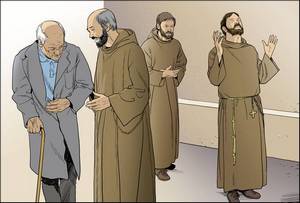 The poor having need of everything must be easygoing, accommodating, peaceful and humble. Francis will write in his Rule: “When my brothers go out into the world, I counsel, warn and recommend them in our Lord Jesus Christ to avoid squabbles and disputes and not to judge others at all. But they should be kind, soothing, understated, mild and humble, deferent and courteous in conversation to everyone.” * 2 Reg 3 :10-11 It should be noted in passing that Francis does not suggest condescension to his brothers as an attitude to have. To condescend is the gesture of a person who stoops to the lower than himself. The poor are not able to stoop lower for they are already lower than those they are appealing to. This will of Francis for himself and his brothers to be at the bottom of the social ladder, poor among the poor, will lead him to choose a name for the brotherhood that will reflect this situation of dependence. One day when they were reading the Rule, he interrupted at the passage where it is written And be they lesser and said, “I will that this brotherhood be called the Order of Lesser Brethren (Friars Minor).” * 1 C 38 And truly they were "lesser," for being subject to all. * Test 19 They looked for the last place and the worst jobs even though this could bring them possible abuse, i.e. an employment situation made difficult by the requirements of the very employment itself or the brutality of bad weather, even a boss’s tyrannical rigor. Francis also saw in this extreme dependence an opportunity of grace for those who gave alms, “Go,” he said to his brothers * 2 C 71, “for at this latest hour the Lesser Brethren have been lent to the world in order that the elect may fulfill in them that which shall bring them this commendation from the Judge: ‘That which ye have done to one of My Lesser Brethren ye have done to Me’.” * Mt 25 :40 and 45. The two Gospel verses are fused together by Saint Francis who replaced the words “for one of these least brothers of mine” (verse 40) by those of verse 45, where the superlative the least ones allows an almost literal application to the Brothers Minor.
The poor having need of everything must be easygoing, accommodating, peaceful and humble. Francis will write in his Rule: “When my brothers go out into the world, I counsel, warn and recommend them in our Lord Jesus Christ to avoid squabbles and disputes and not to judge others at all. But they should be kind, soothing, understated, mild and humble, deferent and courteous in conversation to everyone.” * 2 Reg 3 :10-11 It should be noted in passing that Francis does not suggest condescension to his brothers as an attitude to have. To condescend is the gesture of a person who stoops to the lower than himself. The poor are not able to stoop lower for they are already lower than those they are appealing to. This will of Francis for himself and his brothers to be at the bottom of the social ladder, poor among the poor, will lead him to choose a name for the brotherhood that will reflect this situation of dependence. One day when they were reading the Rule, he interrupted at the passage where it is written And be they lesser and said, “I will that this brotherhood be called the Order of Lesser Brethren (Friars Minor).” * 1 C 38 And truly they were "lesser," for being subject to all. * Test 19 They looked for the last place and the worst jobs even though this could bring them possible abuse, i.e. an employment situation made difficult by the requirements of the very employment itself or the brutality of bad weather, even a boss’s tyrannical rigor. Francis also saw in this extreme dependence an opportunity of grace for those who gave alms, “Go,” he said to his brothers * 2 C 71, “for at this latest hour the Lesser Brethren have been lent to the world in order that the elect may fulfill in them that which shall bring them this commendation from the Judge: ‘That which ye have done to one of My Lesser Brethren ye have done to Me’.” * Mt 25 :40 and 45. The two Gospel verses are fused together by Saint Francis who replaced the words “for one of these least brothers of mine” (verse 40) by those of verse 45, where the superlative the least ones allows an almost literal application to the Brothers Minor.
The poor man face to face with himself
Saint Paul writes to the Galatians, “For if anyone thinks he is something when he is nothing, he is deluding himself.” (Gal 6 :3). Yes indeed ! I can honor God, praise him, obey him, but it may not be for his entirely pure glory and infinite dignity, but because it is the unique and irreplaceable means to obtain my perfection and reach my beatitude. It is not uncommon for us to like less the truth than the part we take for ourselves. In the same way, I can vow to serve my neighbor, accept without complaint his insults and reproaches, but ultimately through ulterior motives only, which seek in patience and service the means to be esteemed, admired, listened to and finally to dominate others. There are many, says Saint Gregory, who afflict their bodies through abstinence but who, through their austerity, are actually vying for human favor * Homily 12. Saint Augustine also condemns certain ascetics who with their sordid clothes seek to capture people’s admiration and charity. The Fathers did not then overlook this natural instinct which seeks and finds itself in every good work as well as behind it. Perhaps, continues Saint Gregory, it is not necessary for man to make a huge effort to leave his possessions; but to abandon himself demands great effort. It is little to renounce what we have, while renouncing ourselves is immense. It is indeed the most bitter of bitterness. However, only the poverty of oneself in oneself gives to every other poverty its true value. “Who made you so important?”, resumes Saint Paul. “What have you got that was not given to you? And if it was given to you, why are you boasting as though it were your own?” (1 Cor 4 :7) Christ makes this renunciation the essential preliminary to following him, “If anyone wants to be a follower of mine, let him renounce himself and take up his cross every day and follow me. For anyone who wants to save his life will lose it; but anyone who loses his life for my sake, will save it.” (Lk 9 :23-24). Renounce yourself. Let us hold on to these few words, for they say everything. It is not only about what we have, for that is not yet charity and poverty. We must renounce what we are, so as to be Jesus. Renouncing ourselves is renouncing living our own life so as to let Jesus live it in us in our place. Being Christian, it is no longer me who lives, it is Christ who lives in me.
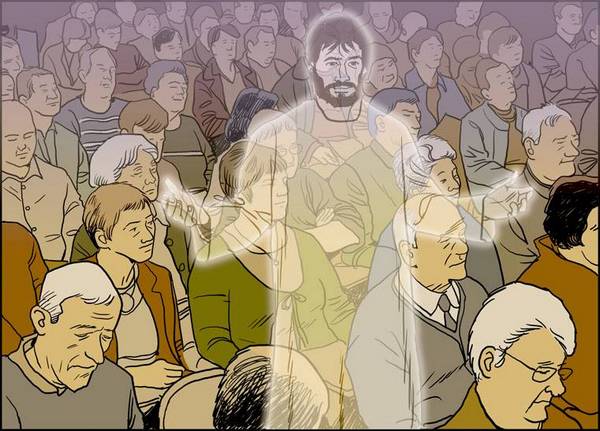
We understand then that this poverty of self reflects that poverty before God previously mentioned. So let us end this passage dedicated to François on the subject by relating some of his admonitions, which show us how necessary it is to be poor in ourselves.
The evil of self will (adm 2)
The Lord said to Adam: Eat of every tree; you may not eat, however, of the tree of the knowledge of good and evil. Adam then was permitted to eat of every tree of paradise; as long as he remained in obedience, he was without sin.
We who eat of the tree of the knowledge of good and evil make our will our own and proudly take credit for the good that we do, whereas in reality it is the Lord in us who accomplishes good through words and acts. And so, through the suggestion of the devil and the transgression of the command, it becomes the apple of the knowledge of evil. Therefore it is fitting that he suffer punishment.
Knowing the Spirit of the Lord (adm 12)
A Servant of God can be known to have the Spirit of the Lord in this way: if, when the Lord performs some good through him, his flesh does not therefore exalt itself, because it is always opposed to every good. Instead he regards himself the more worthless and esteems himself less than all others.
Poverty of Spirit (adm 14)
Blessed are the poor in spirit, for theirs is the kingdom of heaven. There are many who, while insisting on prayers and obligations, inflict many abstinences and punishments on their bodies. But they are immediately offended and disturbed about a single word which seems to be harmful to their bodies or about something which might be taken away from them. These people are not poor in spirit, for someone who is truly poor in spirit hates himself and loves those who strike him on the cheek.
Give every good to the Lord (adm 18)
Blessed is the servant who returns every good to the Lord God because whoever holds onto something for himself hides the money of his Lord God within himself, and what things he has will be taken away from him.
Humility in spite of praise and honors (adm 19)
Blessed is the servant who does not consider himself any better when he is praised and exalted by people than when he is considered worthless, simple and looked down upon, for what a person is before God, that he is and no more.
Woe to that religious who has been placed in high position by others and [who] does not want to come down by his own will. Blessed is that servant who is not placed in a high position by his own will and always desired to be under the feet of others.
DETACHING ONESELF FROM RICHES TO BETTER SERVE CHRIST
Article 11
Trusting in the Father, Christ chose for himself and his Mother a poor and humble life * 1 Let 5., all the while showing an attention full of esteem and respect for the created world. Let the Secular Franciscans seek a proper spirit of DETACHMENT FROM TEMPORAL GOODS by simplifying their own material needs. Let them be mindful that according to the Gospel they are stewards of the goods received for the benefit of God’s children.
Thus in the spirit of the Beatitudes, “pilgrims and foreigners” on their way to the home of the Father should strive to purify their hearts from every tendency and yearning for possession and power. * Rom 8 :27 ; Vatican II, Const. on the Church 7 :4.
Reading this article 11 can be surprising. First we read about Christ and his Mother living a poor and humble life. As a result of this poverty, it is asked of the Secular Franciscan Order’s brothers and sisters not to take a vow of poverty (like the brothers minor or sisters of Claire of Assisi) but 1) to use with detachment material wealth and 2) to free oneself of every tendency and yearning for possession and power!? We will look to explain and understand this apparent anachronism in the following paragraphs, but not before having answered the question: but what then is poverty?
But what then is poverty ?
Poverty is the state in which a person cannot procure the necessary resources for material life. We understand that need can be more or less felt, the necessity more or less compelling, the difficulty of providing more or less insurmountable; and consequently, that there are different degrees of poverty. We can characterize them in a few words:
|
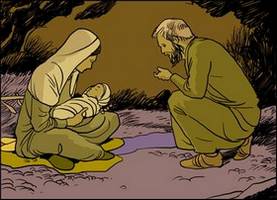 |
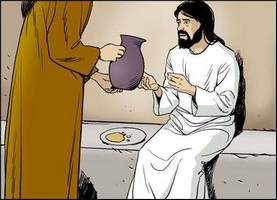 |
|
|
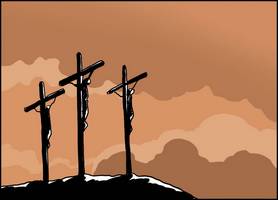 |
The common characteristic of these three states of poverty is privation, which is a lack of more and more numerous and necessary things. But since the poor man cannot by himself meet his needs, he is constrained to resort to the aid of others so as not to suffer excessively or even give up; so he falls under the dependence of those who help him. Just like privation needs patience or endurance, so dependence preaches humility, subjection, obedience. Yet it is through this “creation of virtues” that poverty can acquire a sanctifying value; because by themselves, i.e. privation leading to destitution and dependence leading to slavery, they do not make man pleasing to God. They can even make man guilty if they create vice such as jealousy, anger and hate, rather than virtue. It is not material poverty that Jesus beatified, but the poverty of spirit or desire, love of poverty.
As we distinguished three degrees of need from an economic and human point of view, we will now distinguish three types of poverty according to desire and spirit from an ascetic and divine point of view:
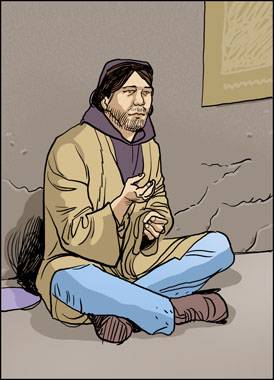 |
|
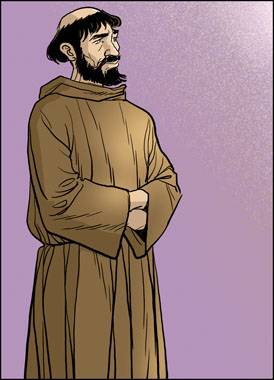 |
|
| 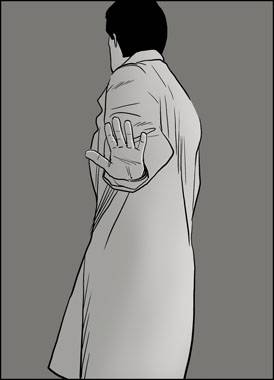 |
Brothers Minor, Poor Clare Sisters, Franciscan laypeople. Three vocations; the same call to poverty
Strong with these definitions, and everything that has been specified since the beginning of this chapter, we are now ready to consider the connection, apparently anachronistic, of Christ and his Mother’s poor and humble life mentioned in Article 11 and, consequently, detachment from material wealth to which Franciscan laypeople are called. We are indeed called to imitate Christ (and his Mother) in his hidden life, according to our condition. We are called there and we must imitate him. Nevertheless, it is neither permitted nor possible for us, without a special call from his Holy Spirit, to claim to follow him in his apostleship and Passion.
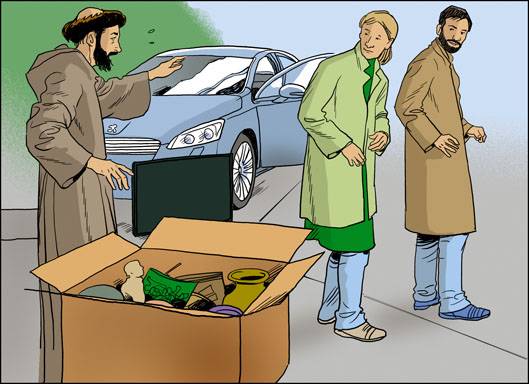 When married couples wanted to drop everything to follow Francis of Assisi, he told them, “Stop! You already have commitments in the world which cannot be broken: marriage, fatherhood and motherhood.” Francis then began to think seriously on the means of reconciling these two callings, one as necessary as the other: that of the duty which holds the Christian in the world, and the Master’s call, which asks him to leave it and follow him, carrying his cross. It was the beginning of the Secular Franciscan Order.
When married couples wanted to drop everything to follow Francis of Assisi, he told them, “Stop! You already have commitments in the world which cannot be broken: marriage, fatherhood and motherhood.” Francis then began to think seriously on the means of reconciling these two callings, one as necessary as the other: that of the duty which holds the Christian in the world, and the Master’s call, which asks him to leave it and follow him, carrying his cross. It was the beginning of the Secular Franciscan Order.
Literal poverty which was mentioned above cannot then be experienced in the same way by Franciscan religious and laypeople. However, if this literal poverty distinguishes the Franciscan religious orders from the laypeople in the eyes of the world, it is not mistaken nor audacious to say that the Brothers Minor, the Poor Clares and the Franciscan laypeople live an identical poverty of spirit following in the footsteps of Christ and his Mother, and Saint Francis and Saint Clare of Assisi. Let us remind ourselves of the terms of our Rule’s very first Article: In various ways and forms but in life-giving union with each other, they (all the Franciscan family members) intend to make present today the true charism of Saint Francis of Assisi in the life and mission of the church. Thus for the Brothers Minor as for the Poor Clares, the vow of poverty (literal) will be a visible sign of the poverty of spirit which opens the way to heaven, as it is indeed this latter which opens the way to heaven. For the Franciscan laypeople, the meaning of this identical poverty of spirit will express itself by a detached use of the material wealth they may have. Because it is not excluded for Franciscan laypeople to have wealth and/or an elevated social standing. Let us recall that two of the three patron saints of the Secular Franciscan Order were in the highest social standing in their countries: Saint Louis, King of France; Saint Elizabeth of Hungary, Queen. But Franciscan laypeople must be very conscious that they are only administrators, and not owners, of the wealth they received from God, and that they received it for God’s children. Having chosen to be poor and persecuted, Christ throws a supernatural light on those who are poor and persecuted like Him, a light which makes the poor loved as if they were Christ himself. The wealthy become then intermediaries for divine Providence. They have the “obligation to convince” others that God is Father and that we are all brothers through an active love. That is moreover the greatest honor that God bestows on the rich. God’s Kingdom is thus open to everyone who loves Him and his fellowman, for we do not get to God’s Kingdom through the fortunes of this world but through justice which is in the practice of the Law (the ten commandments) and in the exercising of love.
Blessed is the man that fears the Lord: he shall delight exceedingly in his commandments. […]
Glory and wealth shall be in his house: and his justice remains forever and ever.
To the righteous a light is risen up in darkness: he is merciful, and compassionate and just.
Acceptable is the man that shows mercy and lends: he shall order his words with judgment. […]
The just shall be in everlasting remembrance: he shall not fear the evil hearing. His heart is ready to hope in the Lord.
He has distributed, he has given to the poor: his justice remains forever and ever: his horn shall be exalted in glory. [...] (Ps 111)
But can poverty and wealth be only material ?
Let us answer this question by first relating a testimony. Afterwards, discussing different forms of poverty, we will reread the story of Naomi and her daughter-in-law Ruth, an illustrative example of the Lord’s bounty expressed through his children.
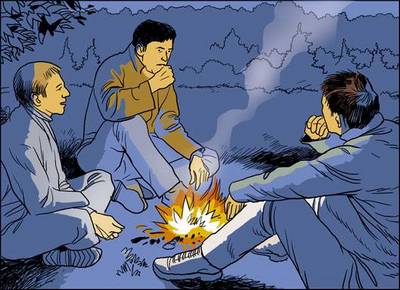 It was in the 1950s. Brother Raymond (OFM) was leading a weekend for Franciscan Tertiaries intended for couples. The setting was a little rustic; for accommodation, tents had been put up at the edge of a forest. The theme was the beatitudes. After a time of reflection, Brother Raymond sends the participants to meditate in the forest, but in couples. He invites them to reflect on the application of the beatitudes in their life as a couple. “Afterwards, those who wish can share their testimony with the others,” says Brother Raymond. One couple, then, did just that. “Like everyone else, we left to walk in the forest and after about ten meters, we had, we thought, pretty well covered the problem. We were not poor, nor persecuted, afflicted, hungry for justice… In short, the conclusion came quickly, the beatitudes were a very beautiful evangelical text which did not concern us. And we continued walking, in silence, one next to the other. However at one point I realize (specifies the husband), that I am walking alone. My wife is no longer at my side. Surprised, I turn around and there, I see her, standing several steps behind me. She looks at me, eyes red with tears. She is crying, silently. I see her and, without a word, I understand. I understand that we are poor, afflicted and hungry. Our couple is infertile. We do not have children and we cannot have them. Because of this infertility, we envy couples who have the grace of this richness and, you may have noticed, we can’t bear children. Their simple presence irritates us. Not being able to have any, we live the opposite of the beatitudes. We are not gentle with children from other families, and this envy which torments us prevents us from having a pure heart. We talked little during the rest of the walk, but the little that we did talk can be summed up in the following way: we are going to change our attitude towards couples with children and towards children themselves.” And Brother Raymond confirmed that from that weekend of the beatitudes, the house of that couple became the “house of the good God”, always full of children happy to be there.
It was in the 1950s. Brother Raymond (OFM) was leading a weekend for Franciscan Tertiaries intended for couples. The setting was a little rustic; for accommodation, tents had been put up at the edge of a forest. The theme was the beatitudes. After a time of reflection, Brother Raymond sends the participants to meditate in the forest, but in couples. He invites them to reflect on the application of the beatitudes in their life as a couple. “Afterwards, those who wish can share their testimony with the others,” says Brother Raymond. One couple, then, did just that. “Like everyone else, we left to walk in the forest and after about ten meters, we had, we thought, pretty well covered the problem. We were not poor, nor persecuted, afflicted, hungry for justice… In short, the conclusion came quickly, the beatitudes were a very beautiful evangelical text which did not concern us. And we continued walking, in silence, one next to the other. However at one point I realize (specifies the husband), that I am walking alone. My wife is no longer at my side. Surprised, I turn around and there, I see her, standing several steps behind me. She looks at me, eyes red with tears. She is crying, silently. I see her and, without a word, I understand. I understand that we are poor, afflicted and hungry. Our couple is infertile. We do not have children and we cannot have them. Because of this infertility, we envy couples who have the grace of this richness and, you may have noticed, we can’t bear children. Their simple presence irritates us. Not being able to have any, we live the opposite of the beatitudes. We are not gentle with children from other families, and this envy which torments us prevents us from having a pure heart. We talked little during the rest of the walk, but the little that we did talk can be summed up in the following way: we are going to change our attitude towards couples with children and towards children themselves.” And Brother Raymond confirmed that from that weekend of the beatitudes, the house of that couple became the “house of the good God”, always full of children happy to be there.
The poverty of spirit which we have talked about up to now and have characterized by dependence and privation, is then a spiritual poverty. This short testimony well illustrates that this poverty of spirit can express itself, can be lived out, in real poverty, which does not necessarily have anything to do with any material poverty, even if, indeed, it does not exclude it. It can come in multiple forms: poverty of the couple’s infertility, poverty of physical health, poverty of solitude or non consecrated celibacy, poverty in conjugal relationships or in work, poverty of unemployment or of the absence of social recognition, poverty of the abandoned spouse, poverty of the death of a spouse or child, poverty of the person whose fault has turned into punishment, poverty of the father of someone who was born unhappy or who has become unhappy, poverty of she whose child has become a criminal and who will be thereafter considered as the mother of an assassin or traitor…However, even poor, we are always rich in something. Even in indigence, the poor can have talents, gifts which others do not and that they can share: “the greatest among you must behave as if he were the youngest, the leader as if he were the one who serves” (Lk 22 :26). Thus God’s goodness distributes gifts and goods among his children so that they help each other and no one is frustrated in the beatitude of charity and poverty. However, the means to obtain the exchange and to reestablish equality between God’s children is not violence which tears away or greed which amasses, but humility which asks, through prayer and sacrifice, divine benevolence to spread one to the other. Ruth’s goodness towards her mother-in-law Naomi is a remarkable example of this (Livre de Ruth).
Ruth and Naomi
Let us look at Naomi’s desolation after she has lost her husband and two sons, her only children. Let us listen to her discouraged parting words to her daughters-in-law, Orpah and Ruth: “Go back, each of you, to your mother's house! May the Lord be kind to you as you were to the departed and to me...” Let us listen to these weary and insistent words. She had no more hope in life, she who had formerly been the beautiful Naomi and who was now the tragic Naomi, broken by pain. She could only think about returning to where she had been happy in her younger days with her husband’s love and her sons’ kisses. She said: “Go back, my daughters! Why should you come with me?... It is as if I were dead... My life is no longer here, but there in the afterlife where they are. Sacrifice your youth no longer for a dying thing, for really I am only a thing. I care for nothing. God took everything from me... I am only anguish. And I would be your anguish, and it would weigh heavy on my heart. And the Lord would ask me reparation for it, He has already struck me down so much, for to keep you who are living near me who is dead would be selfish. Go back to your mothers…”.
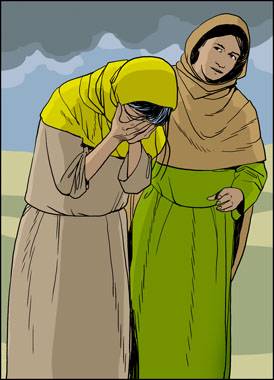 But Ruth, the Moabite, stayed to relieve this painful old age. Ruth had understood that there are pains greater than those we have to bear and that her young widow’s grief was less heavy than the pain of she who, besides her husband, had lost her two sons. How much pain is there in the world!? Like the person’s pain, who for any number of reasons, comes to hate humankind; he sees in every man an enemy from whom he has to defend himself and whom he must fear. His pain is even greater than other pains because it affects not only his flesh, blood, mentality, but also the spirit with its supernatural duties and rights, thus bringing him to his perdition. How many mothers without children and children without mothers are there in the world! How many widows are there without children to help their lonely old age! How many people are there who, deprived of love because they are all unhappy, could use their need to love in fighting hatred through giving love to unfortunate Humanity which always suffers more because it always hates more.
But Ruth, the Moabite, stayed to relieve this painful old age. Ruth had understood that there are pains greater than those we have to bear and that her young widow’s grief was less heavy than the pain of she who, besides her husband, had lost her two sons. How much pain is there in the world!? Like the person’s pain, who for any number of reasons, comes to hate humankind; he sees in every man an enemy from whom he has to defend himself and whom he must fear. His pain is even greater than other pains because it affects not only his flesh, blood, mentality, but also the spirit with its supernatural duties and rights, thus bringing him to his perdition. How many mothers without children and children without mothers are there in the world! How many widows are there without children to help their lonely old age! How many people are there who, deprived of love because they are all unhappy, could use their need to love in fighting hatred through giving love to unfortunate Humanity which always suffers more because it always hates more.
Pain is a cross, but can also be a springboard. Grief strips away, but in order to rebuild. Blessed are those who mourn: they shall be comforted (Mt 5:5). Let us look at the world. It is a barren land where we weep and we die. And the world cries, “Help!” through the mouths of orphans, the sick, the solitary, those who doubt, those who through betrayal and/or cruelty have become prisoners of spitefulness. Let us go towards those who cry out! Let us forget ourselves in the middle of those who are forgotten! Let us heal ourselves among those who are sick! Let us hope among the hopeless. The world is open to all of good will who wish to serve God in his fellowman and conquer Heaven: unite with God and join those who cry. Let us imitate Ruth in all her pain. Let us also say with Ruth, “I will be with you until death.” Even if they respond, those poor unfortunates who consider themselves incurable, “Do not call me Naomi [‘Sweet’]. Call me Mara [‘Bitter’], for the Almighty has made my life very bitter”, let us persist. Thus they could one day say, “Blessed is the Lord who delivered me from bitterness, sadness and solitude with the aid of a creature who knew how to turn her pain into the fruit of goodness. May God bless her eternally for she was my salvation.”
Ruth’s goodness towards Naomi gave the Messiah to the world because He comes from David who comes from Jesse, Jesse from Obed, and Obed from Boaz and Ruth. Every act of goodness is a source of great things of which we have no inkling. The effort that we make against our own selfishness can bring about such a tide of love that it is capable of lifting up, lifting up while keeping in its clarity he who brought it about, up to the foot of the altar, up to the heart of God. * From “Centro Editoriale Valtortiano”, “Isola del Liri”, Italy, The Gospel as it was Revealed to Me, Maria Valtorta, Vol. 3, ch. 71, p. 433.
Pilgrims and foreigners going towards the Father’s house
The last paragraph of our Article 11 is introduced by a clarification (in the spirit of the beatitudes) which gives a particular tone to the two sentences which follow it.
When we read and meditate on the beatitudes, we may be surprised by the tenses of the verbs used. With the exception of the beatitude of poverty of spirit and of persecution for justice ( where the verbs are in the present tense), all the other beatitudes use verbs conjugated in the future tense, as if all the virtues practiced today would only bear fruit later. This future expressed by the verbs’ tense also means that we will not last eternally in this present world. Moreover, we are in the world but we do not belong to the world (John 17:6), like foreigners experience. Truly we are all foreigners. But we are foreigners “on the way to”, i.e. we enter into a divine dynamic, following the way opened by Christ so as to be with Him in the heart of the Father. The New Testament "abounds" in indications which express well this double peculiarity of pilgrims and foreigners, on the way to the Father’s house: United with Christ in the Church and marked by the Holy Spirit who is the pledge of our inheritance (Eph 1:14), we are called the children of God, and so we are (1 John 3:1). But we have not yet appeared with Christ, in glory (Col 3:4). It is there that we shall be like God, for we shall see him as He is (1 John 3:2). Then we realise that as long as we are at home in the body we are exiled from the Lord (2 Cor 5:6) and we too, who have the first-fruits of the Spirit, even we are groaning inside ourselves (Rm 8:23) and we when he comes to be glorified among his holy ones and to be marveled at on that day among all who have believed (2 Thess 1:10).
To free oneself from every tendency and yearning for possession and power
Article 11’s ending talks about freeing oneself from every tendency and yearning for possession and power, as if desire itself poisoned or even imprisoned the person who was the object of it. And yet it is perfectly true, and to such an extent that the Lord himself, in the ninth and tenth commandments * The tenth commandment unfolds and completes the ninth, which is concerned with concupiscence of the flesh. It forbids coveting the goods of another, as the root of theft, robbery, and fraud, which the seventh commandment forbids. "Lust of the eyes" (1 John 2:16) leads to the violence and injustice forbidden by the fifth commandment. Avarice, like fornication, originates in the idolatry prohibited by the first three prescriptions of the Law. The tenth commandment concerns the intentions of the heart; with the ninth, it summarizes all the precepts of the Law. CCC 2534. of the ten commandments, requires us to covet nothing, greed being nothing other than this desire which imprisons: “You shall not covet your neighbor’s house. You shall not covet your neighbor’s wife, his male or female slave, his ox or donkey, or anything that belongs to your neighbor” (Ex 20 :17). We will reflect then on this commandment which our Rule so obviously refers to.
God gives to each of us what is needed. It is the truth. What is necessary to man? Pomp and ceremony ? So much land that we cannot count the fields ? Banquets where we see, after night falling, the day dawning ? No. None of it. What is necessary to man is a roof, bread, clothing ; in short, life’s essentials. Look around you: who are the happiest and healthiest? Who enjoy a healthy and peaceful old age? Pleasure seekers? No. Rather those who live honestly, work and limit their desires. They do not have the poison of luxury and so remain strong, nor the poison of banquets and so remain agile, nor the poison of envy and so remain joyful. Whereas those who always want more have neither peace nor joy.
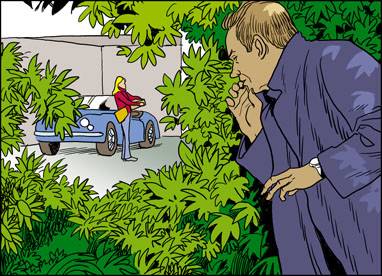 The more they drink, the thirstier they are. The more they eat, the hungrier they are. They have an early old age. They are burned by resentment and abuse. We could combine the commandment not to steal and the one not to covet. Because in fact, excessive desire leads to theft. There is only one step from one to the other. Could we say, however, that all desire is illicit? Let us not go that far. The father of a family who, by working in the fields or in a factory, wants to have enough to feed his children, truly does not sin. He fulfils his role as a father. But the person who, on the contrary, wants nothing more than greater pleasure and takes what belongs to others to add to his enjoyment, that person sins. Envy! Why? What is the desire of other’s belongings but greed and envy ? Envy separates from God and unites with Satan. The first who desired what did not belong to him was Lucifer. He was the most beautiful of the archangels, he was with God. He should have been content with that. He envied God and wanted, himself, to be God, and he became a demon, the first demon. Second example: Adam and Eve had everything; they enjoyed earthly paradise, God’s friendship, and were happy with the gifts of grace God had given them. They should have been content with that. They envied God the knowledge of good and evil and were chased out of Eden (Gen 3:23). They were the first sinners. Third example: Cain envied Abel because of his friendship with the Lord. And he became the first murderer (Gen 4 :8). Another example: Myriam, Aaron and Moses’s sister, envied her brother and became the first leper in Israel’s history (Num 12:10). We could go on and on through all the lives of God’s people, and we would see that excessive desire made the person who had it a sinner and led the nation to chastisement. The sins of individuals accumulate and lead to the nations’ retribution. It is like grains, grains, grains of sand multiplying through the centuries to cause a landslide which submerges the countries and everything in them.
The more they drink, the thirstier they are. The more they eat, the hungrier they are. They have an early old age. They are burned by resentment and abuse. We could combine the commandment not to steal and the one not to covet. Because in fact, excessive desire leads to theft. There is only one step from one to the other. Could we say, however, that all desire is illicit? Let us not go that far. The father of a family who, by working in the fields or in a factory, wants to have enough to feed his children, truly does not sin. He fulfils his role as a father. But the person who, on the contrary, wants nothing more than greater pleasure and takes what belongs to others to add to his enjoyment, that person sins. Envy! Why? What is the desire of other’s belongings but greed and envy ? Envy separates from God and unites with Satan. The first who desired what did not belong to him was Lucifer. He was the most beautiful of the archangels, he was with God. He should have been content with that. He envied God and wanted, himself, to be God, and he became a demon, the first demon. Second example: Adam and Eve had everything; they enjoyed earthly paradise, God’s friendship, and were happy with the gifts of grace God had given them. They should have been content with that. They envied God the knowledge of good and evil and were chased out of Eden (Gen 3:23). They were the first sinners. Third example: Cain envied Abel because of his friendship with the Lord. And he became the first murderer (Gen 4 :8). Another example: Myriam, Aaron and Moses’s sister, envied her brother and became the first leper in Israel’s history (Num 12:10). We could go on and on through all the lives of God’s people, and we would see that excessive desire made the person who had it a sinner and led the nation to chastisement. The sins of individuals accumulate and lead to the nations’ retribution. It is like grains, grains, grains of sand multiplying through the centuries to cause a landslide which submerges the countries and everything in them.
Let us imitate the birds in the freedom of their desires. Look at them in the middle of winter. There is little food. But do they worry in the summer about hoarding food for the winter? No. They trust in the Lord. They know that a little worm, a seed, a crumb, a fragment, a gnat on the water, they can always catch for their stomach. They know that there will always be a warm chimney or a piece of wool to provide refuge in winter. They also know that when the time comes to find hay for their nests and more abundant food for their young, there will be sweet-smelling hay in the prairies, succulent food in the orchards and furrows, and that the air and earth will be full of insects.
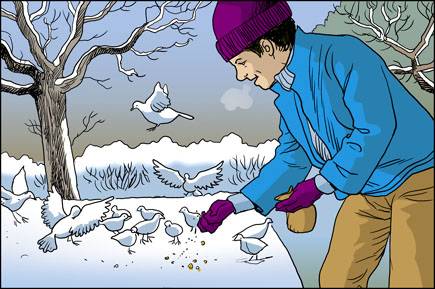 And they sweetly sing, “Thank you, Creator, for what you give us and will give us”, quick to exhale full-throated hosannas. Does a more cheerful creature than a bird exist? And yet what is its intelligence compared to that of a human? A speck of dust compared to a mountain. But we can learn from them. Truly the person who possesses a bird’s cheerfulness lives without impure desires. He trusts in God and finds in Him a Father. He smiles at the breaking day and the falling night, because he knows that the sun is his friend and the night his nanny. He looks at others without resentment and does not fear their vengeance, for he has done them no wrong. He has no fear for his health nor his sleep because he knows that an honest life wards off disease and brings a sound sleep. Finally, he does not fear death for he knows that having acted well, he can only receive God’s smile. Even the king dies and the rich as well. There is no scepter which takes away death, and money cannot buy immortality. In the presence of the King of kings and Lord of lords, crowns and money are only pleasantries. The only crown of any value is a life lived according to divine will. * From « Centro Editoriale Valtortiano », « Isola del Liri », Italy, The Gospel as it was Revealed to Me, Maria Valtorta, Vol. 2, chap. 98, p. 577.
And they sweetly sing, “Thank you, Creator, for what you give us and will give us”, quick to exhale full-throated hosannas. Does a more cheerful creature than a bird exist? And yet what is its intelligence compared to that of a human? A speck of dust compared to a mountain. But we can learn from them. Truly the person who possesses a bird’s cheerfulness lives without impure desires. He trusts in God and finds in Him a Father. He smiles at the breaking day and the falling night, because he knows that the sun is his friend and the night his nanny. He looks at others without resentment and does not fear their vengeance, for he has done them no wrong. He has no fear for his health nor his sleep because he knows that an honest life wards off disease and brings a sound sleep. Finally, he does not fear death for he knows that having acted well, he can only receive God’s smile. Even the king dies and the rich as well. There is no scepter which takes away death, and money cannot buy immortality. In the presence of the King of kings and Lord of lords, crowns and money are only pleasantries. The only crown of any value is a life lived according to divine will. * From « Centro Editoriale Valtortiano », « Isola del Liri », Italy, The Gospel as it was Revealed to Me, Maria Valtorta, Vol. 2, chap. 98, p. 577.
Article 13
As the Father sees in every person the features of his Son, the firstborn of many brothers and sisters * Rom 8:29.; so the Secular Franciscans with a gentle and courteous heart will accept all people as a gift from the Lord * 2 C 85 ; 1 Rule 26 ; 1 Rule 7:13. and an image of Christ.
A SENSE OF COMMUNITY will prepare them to consider with joy as equals all people, especially the lowliest, for whom they shall strive to create conditions of life worthy of people redeemed by Christ. * 1 Rule 9:3 ; Mt 25:40
To welcome our neighbor, especially this neighbor who we have a hard time liking, demands a stripping away on our part and the acceptance of poverty. This stripping away has multiple facets: stripping away our time, so precious, though, for getting things done, oh how much more important than welcoming an “inconvenient friend”; stripping away the pleasure of meeting others in our “own little world”… In the Rule of 1221, Francis summarizes in a few words the ins and outs of this condition of poverty necessary for welcoming our neighbor: “All the brothers will apply themselves to following the humility and poverty of our Lord Jesus Christ […]. They must rejoice when they find themselves among people of low condition and despised, the poor and disabled, the sick and leprous, and the beggars in the streets. * 1 Rule 9 :1-2 ”
First-born of a multitude of brothers
The first chapter of this manual reveals to us that God is Love and that it is through love that He created us. And He created us in his image: Love. He created us for love. Thus, from before his birth, man is predestined to reproduce the image of God's Son made man, the "image of the invisible God" (Col 1:15), so that Christ shall be the first-born of a multitude of brothers and sisters * From CCC 381. loving God and his neighbor. So it is not suprising to see our Rule invite the Secular Franciscans to welcome all people with their heart, for it is with the heart that we serve God. The heart’s disposition, necessary for this acceptance, is even specified. The heart must be humble, i.e. it must lower itself, put itself voluntarily lower than its rightful position, just like Christ did not jealously hold onto his rank as God’s equal but lowered himself to make himself similar to man. The heart must equally be courteous, i.e., this heart which speaks, loves and acts towards others with exquisite courtesy bringing them peace and joy. What courtesy our Lord Jesus Christ showed to Zacchaeus, who was looked down on in society by the “pure and perfect”; “Zacchaeus, “If anyone wishes to come after me, 1) he must deny himself and 2) take up his cross daily and 3) follow me (Lk 9:23). The path to perfection passes by the Cross. There is no holiness without renunciation and spiritual combat. Spiritual progress implies asceticism and mortification which gradually lead to living in the peace and joy of the beatitudes.
Like a gift of the Lord and an image of Christ
How we love our « little homes », our « little selves », with our little habits, our little certainties, with our little very particular prayers of thanksgiving, “O God, I thank you that I am not like the rest of humanity—greedy, dishonest, adulterous—or even like this tax collector…” (Lk 18:11), when concerning this same tax collector, Jesus announces, “today I must stay at your house!” We are always more prompt to exclude our neighbor than to welcome him, and our lowly reasons for this exclusion are multiple. However, the one that surpasses all the others can be summarized by this detestable and spontaneous feeling, “he is not like me”. I am white and he is black. I am Christian and he is Muslim. I am rich and he is poor. I am cultivated and he is a fool. Isn’t that the abhorrent assessment we make? For has any man in the world ever been able to choose his birthplace (Europe, Africa, Asia…)? Or the family he was born into (a royal family or a travelling family…)? Or the religion of his fathers (Christian, Muslim, Jewish, …)? The Lord is the father of all men. God created all men in his image, in his likeness, but also with his own particular character. All children of the same Father, all however, unique, different from each other. Isn’t it the same, on a smaller scale, in the same family: all the children of the same father and the same mother can be similar in likeness while at the same time being different from each other.
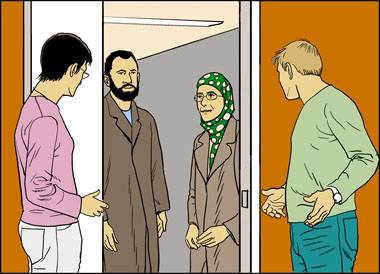 Our Rule invites me to welcome this neighbor, always different, like a gift from the Lord. Francis, in his Testament, summarizes the divine initiative at the origin of this gift very well: “After the Lord had given me brothers…” But what is a gift if not a blessing, a gratification, generosity, an offering, a present, in short something good for me! My neighbor cannot be received like an enemy, but like a gift that the Lord grants me because in this neighbor is inevitably found an image of Christ. It is up to me to look for and see it like my Father in heaven sees his Son’s traits in every man.
Our Rule invites me to welcome this neighbor, always different, like a gift from the Lord. Francis, in his Testament, summarizes the divine initiative at the origin of this gift very well: “After the Lord had given me brothers…” But what is a gift if not a blessing, a gratification, generosity, an offering, a present, in short something good for me! My neighbor cannot be received like an enemy, but like a gift that the Lord grants me because in this neighbor is inevitably found an image of Christ. It is up to me to look for and see it like my Father in heaven sees his Son’s traits in every man.
Creating conditions of life worthy of people redeemed by Christ
Article 13’s last lines begin by reminding us that it is a sense of community which inclines us to joyously look on every man as his equal. But how do we serve God by serving our fellowman? By rendering to God all that the world, the flesh, the devil have taken from God. And how do we do that? Through love. Love which has a thousand ways to express itself and knows only one ending : to be loved. The world is full of people dying of hunger and thirst, poor naked people, strangers, the sick, prisoners, people crying, and whose daily misery can be so many raised walls between their souls and the beatific vision of their Creator, Redeemer and Savior. Creating conditions of life worthy of people redeemed by Christ is to give food to the hungry, drink to the thirsty, to clothe the naked, welcome strangers, visit the sick or prisoners, to be compassionate to those who cry, bear the unwanted… God is mercy because God is Love. God’s servant must be merciful in order to imitate God. God uses mercy to attract his lost sons to Him. And God’s servant must use mercy as a means of bringing God to His lost sons.
Giving food to the hungry is a duty of recognition and love. It is a duty of imitation. We love God by giving bread to those who are hungry, remembering the many times He sated man through the miraculous continual act of the seed which sprouts, of the gift of the earth itself - crops, of the ordering of the wind, heat and rain that He grants us. All is given by God’s pure bounty. Giving food to the hungry is a prayer of gratitude to the Lord. It is imitating the Father who created us in his image and likeness, following Him through our acts.
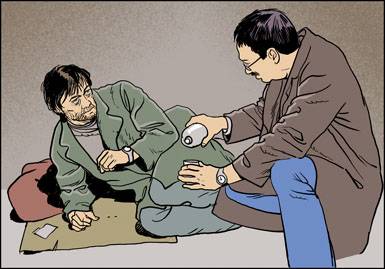 Give drink to the thirsty. The waters belong to God. They are for everyone. Give water to those who are thirsty. For such a small good deed, which costs nothing, which involves no other fatigue than offering a cup or a pitcher, there will be a reward in heaven. For it isn’t the water, but the charitable act, which is great in God’s eyes.
Give drink to the thirsty. The waters belong to God. They are for everyone. Give water to those who are thirsty. For such a small good deed, which costs nothing, which involves no other fatigue than offering a cup or a pitcher, there will be a reward in heaven. For it isn’t the water, but the charitable act, which is great in God’s eyes.
Clothe those who are naked. If we look over the vast earth, we can see everywhere naked people or those covered only with rags. These people, humiliated, look at the rich who go by in sumptuous clothes. Humiliation and goodness are felt by those who are good; humiliation and hate by those who are less good. Let us help their humiliation by making them better if they are good, by destroying hate through our love if they are less good. Let us not say, “I only have enough for me.” Like the bread, we always have something more than those who are absolutely abandoned. Even from an old garment, an old sheet, something good can be made. Give like God gives. Give in the Lord’s name, without fear of becoming naked. It is better to die of cold from having given everything to a beggar than letting your heart freeze, even in the warmest clothes, through lack of charity. The warmth of the good that we have done is sweeter for the person who receives it than that of a coat of the purest wool, and the body of the poor person who has been clothed speaks to God and tells him, “Bless the person who clothed me.”
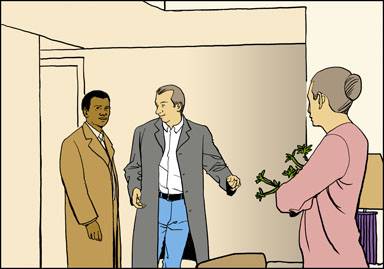 Welcome the stranger. Why do we think, when faced with a traveler or stranger, “What if he’s a thief or murderer?” Do we hold our wealth so dear that every stranger who goes by makes us tremble for its safety? Do we hold our life so dear that we shiver in horror at the thought of losing it? And what? We fear a thief in a passer-by yet are not afraid of the dark host living in our heart and stealing from us what is irreplaceable? Is there only good then in wealth and existence? Is not eternity, which we let be stolen away and killed through sin, more precious? Why see in every traveler a thief? We are brothers. The house opens its doors to those brothers passing by. The traveler is not of our blood? Oh, yes he is! He is of the blood of Adam and Eve. He isn’t our brother ? And how is that ? There is only one Father : God gave us the same soul, like a father gives the same blood to his children of the same mother. He (the stranger) is poor? Beware that our spirit is not poorer than he is, deprived of the Lord’s friendship. His clothes are torn? Beware that our soul is not torn worse in God’s eyes. His appearance is unpleasant ? Beware that ours isn’t worse in God’s eyes. He speaks a strange language ? Beware that our heart’s language is not incomprehensible in God’s City. Let us see a brother in the traveler. We are all travelers on the road to heaven and are all knocking on the doors along the path which leads to heaven. Each time we open our house and our arms in greeting to a stranger, using the gentle name of brother because we are thinking of God who knows him, know that the Lord has brought us forward several miles on that road to heaven.
Welcome the stranger. Why do we think, when faced with a traveler or stranger, “What if he’s a thief or murderer?” Do we hold our wealth so dear that every stranger who goes by makes us tremble for its safety? Do we hold our life so dear that we shiver in horror at the thought of losing it? And what? We fear a thief in a passer-by yet are not afraid of the dark host living in our heart and stealing from us what is irreplaceable? Is there only good then in wealth and existence? Is not eternity, which we let be stolen away and killed through sin, more precious? Why see in every traveler a thief? We are brothers. The house opens its doors to those brothers passing by. The traveler is not of our blood? Oh, yes he is! He is of the blood of Adam and Eve. He isn’t our brother ? And how is that ? There is only one Father : God gave us the same soul, like a father gives the same blood to his children of the same mother. He (the stranger) is poor? Beware that our spirit is not poorer than he is, deprived of the Lord’s friendship. His clothes are torn? Beware that our soul is not torn worse in God’s eyes. His appearance is unpleasant ? Beware that ours isn’t worse in God’s eyes. He speaks a strange language ? Beware that our heart’s language is not incomprehensible in God’s City. Let us see a brother in the traveler. We are all travelers on the road to heaven and are all knocking on the doors along the path which leads to heaven. Each time we open our house and our arms in greeting to a stranger, using the gentle name of brother because we are thinking of God who knows him, know that the Lord has brought us forward several miles on that road to heaven.
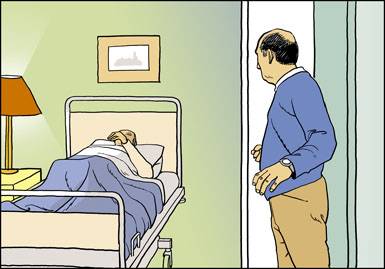 Visit the sick. Truly, in the same way that all men are travelers, all men are sick. Firstly, we are not to be afraid of physical sickness. The spirit is corrupted, not by material things, but by spiritual ones. If someone treats a leper, his spirit doesn’t become leprous, but on the contrary, because of his heroic charity even unto isolation in the valley of death and sickness, for pity’s sake of his brother, every stain of sin falls from him. For charity is sin’s absolution and the first of purifications. And the most seriously ill are not those in body but in spirit: sicknesses that can’t be seen are the most fatal. Remarkably, they don’t cause disgust?! The moral wound doesn’t inspire revulsion! Vice’s stench doesn’t cause nausea ! A spiritual leper’s gangrene doesn’t repel! Always start from the thought, “What would I want someone to do for me if I was like that?” And do as we would have done to us.
Visit the sick. Truly, in the same way that all men are travelers, all men are sick. Firstly, we are not to be afraid of physical sickness. The spirit is corrupted, not by material things, but by spiritual ones. If someone treats a leper, his spirit doesn’t become leprous, but on the contrary, because of his heroic charity even unto isolation in the valley of death and sickness, for pity’s sake of his brother, every stain of sin falls from him. For charity is sin’s absolution and the first of purifications. And the most seriously ill are not those in body but in spirit: sicknesses that can’t be seen are the most fatal. Remarkably, they don’t cause disgust?! The moral wound doesn’t inspire revulsion! Vice’s stench doesn’t cause nausea ! A spiritual leper’s gangrene doesn’t repel! Always start from the thought, “What would I want someone to do for me if I was like that?” And do as we would have done to us.
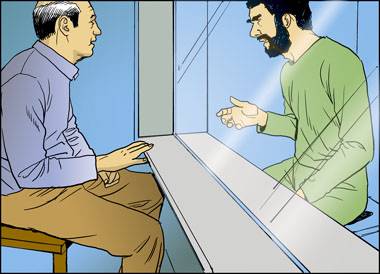 Visit prisoners. Even if all prisoners were thieves and murderers, it isn’t right to make ourselves thieves and murderers by taking away their hope of forgiveness through our contempt. Poor prisoners! They don’t dare lift their eyes to God, burdened as they are by their faults. The chains, indeed, bind their spirits more than their feet. But beware if they despair of God! To the crime against their neighbor, they are adding the loss of hope of forgiveness. May brotherly love be directed to the convict or prisoner. It will be a light in the darkness, a voice, a hand which shows the heights while the voice says, “May my love tell you that God also loves you. It is He who put this love for you in my heart, my unfortunate brother”, and the light allows a glimpse of God the Father full of pity.
Visit prisoners. Even if all prisoners were thieves and murderers, it isn’t right to make ourselves thieves and murderers by taking away their hope of forgiveness through our contempt. Poor prisoners! They don’t dare lift their eyes to God, burdened as they are by their faults. The chains, indeed, bind their spirits more than their feet. But beware if they despair of God! To the crime against their neighbor, they are adding the loss of hope of forgiveness. May brotherly love be directed to the convict or prisoner. It will be a light in the darkness, a voice, a hand which shows the heights while the voice says, “May my love tell you that God also loves you. It is He who put this love for you in my heart, my unfortunate brother”, and the light allows a glimpse of God the Father full of pity.
Bury the dead. The contemplation of death is a school of life. As God said, dust to dust. And nevertheless, simply because this dust wrapped the spirit and was enlivened, it should be considered sanctified dust in a way which does not differ from objects which touched the Tabernacle. By its unique Origin the soul communicates beauty to physical matter and because of this beauty which comes from God the body is embellished and deserves respect. We are temples, and as such we deserve honor as did all the places where the Tabernacle stood.
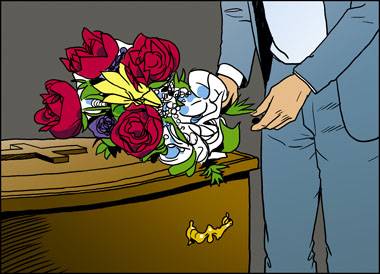 Then let us give to the dead the mercy of an honored rest in anticipation of the resurrection. But man is not only flesh and blood. He is also soul and thought. Souls also suffer and we must meet their needs with mercy. Let us give spirit’s bread to hungry spirits. Educating those who don’t know God corresponds, in the spiritual order, to feeding the starving, and if we receive a reward for bread given to a languishing body so that it doesn’t die on that day, what reward will be given to the person who feeds a spirit the eternal truths, giving him eternal life? Let us not be greedy with what we have received. It was given to us freely and without measure. Give also without stinginess for it is from God, like water from the sky, and we must give as we were given. Let us give the crystal clear and beneficial refreshment of prayer to the living and the dead who are thirsty for grace. We mustn’t refuse water to parched throats. What should we give then to anxious hearts of the living and the suffering spirits of the dead? Prayer, prayer, fruitful because it is inspired by love and a spirit of sacrifice. Pray more through our sacrifices than with our lips and we will give rest to the living and the dead by doing the second work of spiritual mercy. The world will be better saved through the prayer of those who pray than with clamorous, needless, deadly battle.
Then let us give to the dead the mercy of an honored rest in anticipation of the resurrection. But man is not only flesh and blood. He is also soul and thought. Souls also suffer and we must meet their needs with mercy. Let us give spirit’s bread to hungry spirits. Educating those who don’t know God corresponds, in the spiritual order, to feeding the starving, and if we receive a reward for bread given to a languishing body so that it doesn’t die on that day, what reward will be given to the person who feeds a spirit the eternal truths, giving him eternal life? Let us not be greedy with what we have received. It was given to us freely and without measure. Give also without stinginess for it is from God, like water from the sky, and we must give as we were given. Let us give the crystal clear and beneficial refreshment of prayer to the living and the dead who are thirsty for grace. We mustn’t refuse water to parched throats. What should we give then to anxious hearts of the living and the suffering spirits of the dead? Prayer, prayer, fruitful because it is inspired by love and a spirit of sacrifice. Pray more through our sacrifices than with our lips and we will give rest to the living and the dead by doing the second work of spiritual mercy. The world will be better saved through the prayer of those who pray than with clamorous, needless, deadly battle.
Clothe those who are naked in spirit. How do we clothe those who are naked in spirit? By forgiving those who have sinned against us.
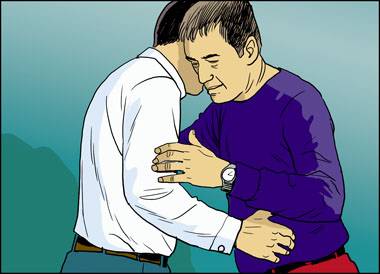 An insult is a sin against charity. It strips us of God. The person who commits the offence strips himself naked. Forgiveness from the offended person can reclothe this nudity, because it restores God. God waits for the offended person to forgive before forgiving. Forgiving the offended as well as the offender whose sin is against man and God. Let’s not delude ourselves and be hypocrites. There is no one who has not offended his Lord. But God forgives us if we forgive our neighbor, and He forgives our neighbor if the offended person forgives. It will be done to us as we have done to others. Forgive, then, if we want to be forgiven and enjoy heaven because of the charity given.
An insult is a sin against charity. It strips us of God. The person who commits the offence strips himself naked. Forgiveness from the offended person can reclothe this nudity, because it restores God. God waits for the offended person to forgive before forgiving. Forgiving the offended as well as the offender whose sin is against man and God. Let’s not delude ourselves and be hypocrites. There is no one who has not offended his Lord. But God forgives us if we forgive our neighbor, and He forgives our neighbor if the offended person forgives. It will be done to us as we have done to others. Forgive, then, if we want to be forgiven and enjoy heaven because of the charity given.
Be merciful to those who weep. They weep, those whom life has hurt, those whose heart has been broken in their affections. Let’s not shut ourselves up in our serenity, as if in a fortress. Cry with those who cry, comfort those who are afflicted, fill the emptiness of the person who has lost a family member through death. Fathers with orphans, children with parents, brothers to each other. Let us love. Why only love those who are happy? They already have their part of the sun. Love those who weep. They are the least loveable in the world, but the world does not know the value of tears. Love them if they have resigned themselves to their grief. Love them, and still more, if the pain makes them rebel.
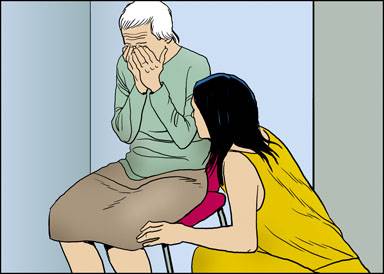 No reproaches, but gentleness to persuade them in their pain of the utility of suffering. They can see in a distorted way, through their veil of tears, God’s face, reducing it, however, to the expression of an all-powerful avenger. No. Let us not take offence! It’s only a hallucination which comes from the fever of suffering. We should come to their aid to bring down their fever. Then, when the strongest fever is past, and come dejection and blank bewilderment to the one who underwent the trauma, let us begin again to speak about God, as about a new thing, slowly, patiently. And then quiet. Do not insist… The soul works on its own. Help it through caresses and prayer. And when he says, “Then it wasn’t God?”, respond, “No, He didn’t want to hurt you, He loves you.” And when the soul says, “But I accused Him.”, say, “He has forgotten it because it was the fever talking.” And when he says, “Then, I want Him.”, say, “Here He is! He is at the door of your heart, waiting for you to open it.”
No reproaches, but gentleness to persuade them in their pain of the utility of suffering. They can see in a distorted way, through their veil of tears, God’s face, reducing it, however, to the expression of an all-powerful avenger. No. Let us not take offence! It’s only a hallucination which comes from the fever of suffering. We should come to their aid to bring down their fever. Then, when the strongest fever is past, and come dejection and blank bewilderment to the one who underwent the trauma, let us begin again to speak about God, as about a new thing, slowly, patiently. And then quiet. Do not insist… The soul works on its own. Help it through caresses and prayer. And when he says, “Then it wasn’t God?”, respond, “No, He didn’t want to hurt you, He loves you.” And when the soul says, “But I accused Him.”, say, “He has forgotten it because it was the fever talking.” And when he says, “Then, I want Him.”, say, “Here He is! He is at the door of your heart, waiting for you to open it.”
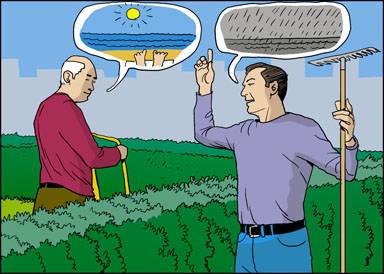 Bear the unwanted. They come to disturb the small house of our me, as travelers come to disturb the house in which we live. They are unwanted, but if we don’t love them because of the disturbance they cause, they, more or less well, love us. Welcome them because of this love. And even if they have just asked an indiscreet question, told us their hate, insulted us, be patient and charitable. We can make them better with our patience, but we can offend them by our lack of charity. We suffer to see them sin; but we will suffer more if we make them sin and sin ourselves. Welcome them in the name of the Lord if we cannot receive them with our love. And God will give us a reward by coming Himself, then, to visit us and erase the unpleasant memory through his supernatural caresses. * From Centro Editoriale Valtortiano, Isola del Liri, Italy, The Gospel as it was revealed to me, Maria Valtorta, Vol. 4, Chap. 139, p. 139 and following.
Bear the unwanted. They come to disturb the small house of our me, as travelers come to disturb the house in which we live. They are unwanted, but if we don’t love them because of the disturbance they cause, they, more or less well, love us. Welcome them because of this love. And even if they have just asked an indiscreet question, told us their hate, insulted us, be patient and charitable. We can make them better with our patience, but we can offend them by our lack of charity. We suffer to see them sin; but we will suffer more if we make them sin and sin ourselves. Welcome them in the name of the Lord if we cannot receive them with our love. And God will give us a reward by coming Himself, then, to visit us and erase the unpleasant memory through his supernatural caresses. * From Centro Editoriale Valtortiano, Isola del Liri, Italy, The Gospel as it was revealed to me, Maria Valtorta, Vol. 4, Chap. 139, p. 139 and following.
No one who comes to me will ever hunger; no one who believes in me will ever thirst. (John 6 :35). Creating conditions of life worthy of creatures redeemed by Christ is to relieve the suffering of the world, material and spiritual suffering. All of that will not go unrewarded. For if we are given a reward for a glass of water offered to a passer-by who is thirsty, what will be given for having taken away infernal thirst from a spirit?
QUESTIONS
What did I retain?
1) The Beatitudes appear like a summary of the Lord’s thought. They are like paths that the Lord invites us to take. Am I capable of listing these paths? And am I capable of specifically defining what a beatitude is?
2) Perfect joy, so pleasantly explained in chapter 8 of the Fioretti (Little Flowers), gives us two important lessons. What are these two important lessons?
3) How we can assert that the Brothers Minor, the Poor Clares and the Secular Brothers of Saint François (as well as all the Capuchin Brothers and all the members of the various branches of the Franciscan family) are called to live by the same Evangelical poverty?
For further reflection
1) The first Eucharistic prayer formulates its intercession for the assembly in this way: “And we sinners, who put our hope in your inexhaustible mercy, admit us into the community of the blessed Apostles and Martyrs… and all the saints. Welcome us in their company, without judging us on our merits but granting your forgiveness, through Jesus Christ our Lord.” What connections can I find between this prayer and the beatitudes from Matthew 5:1-12?
2) In his admonition 14, Francis reveals to me through the concrete example of the insult made to the Pharisee that I am, i.e. to my dear “self”, what the true spirit of poverty is. What resolution(s) can I make today to live by this spirit of poverty with those closest to me (but without neglecting the rest, as the Lord reminds me so strongly (Mt 23:23)) ?
3) What concrete resolution(s) can I make so as to be, from now until my death, a servant of Providence ?


